The Ultimate Guide to Hiring E-Commerce Developers for Retail Projects
Vilmate expertisee-commerceguidehrMost retail businesses have already moved online and are competing in a large and fast-growing digital market. Developers make this transition possible. They build e-commerce websites, mobile apps, POS systems, and other essential tools.
Working on an e-commerce project isn't easy. It requires specific knowledge and a deep understanding of how online retail works. A good developer should know how to create smooth customer experiences, connect different systems, and handle all the technical details behind the scenes.
Finding the right person for the job can be a real challenge—especially when the project is complex and every detail matters. Fast page loading, integration with ERP systems, and a seamless user experience can all be critical to success.
This article will explore what to look for when hiring a developer for an e-commerce project. Which skills matter most? How do you know if someone is the right fit? And what questions should you ask during the interview?
To help us answer these questions, we've spoken with Serhii Pruhlo, a recruiter at Vilmate, who knows exactly what makes a great developer for online retail.
Why Finding E-commerce Developers Is So Challenging — and Why It Matters
At first glance, development seems straightforward — code, frameworks, tasks. However, hiring a developer for an e-commerce project differs significantly from hiring in other areas. And it's not just about technical skills.
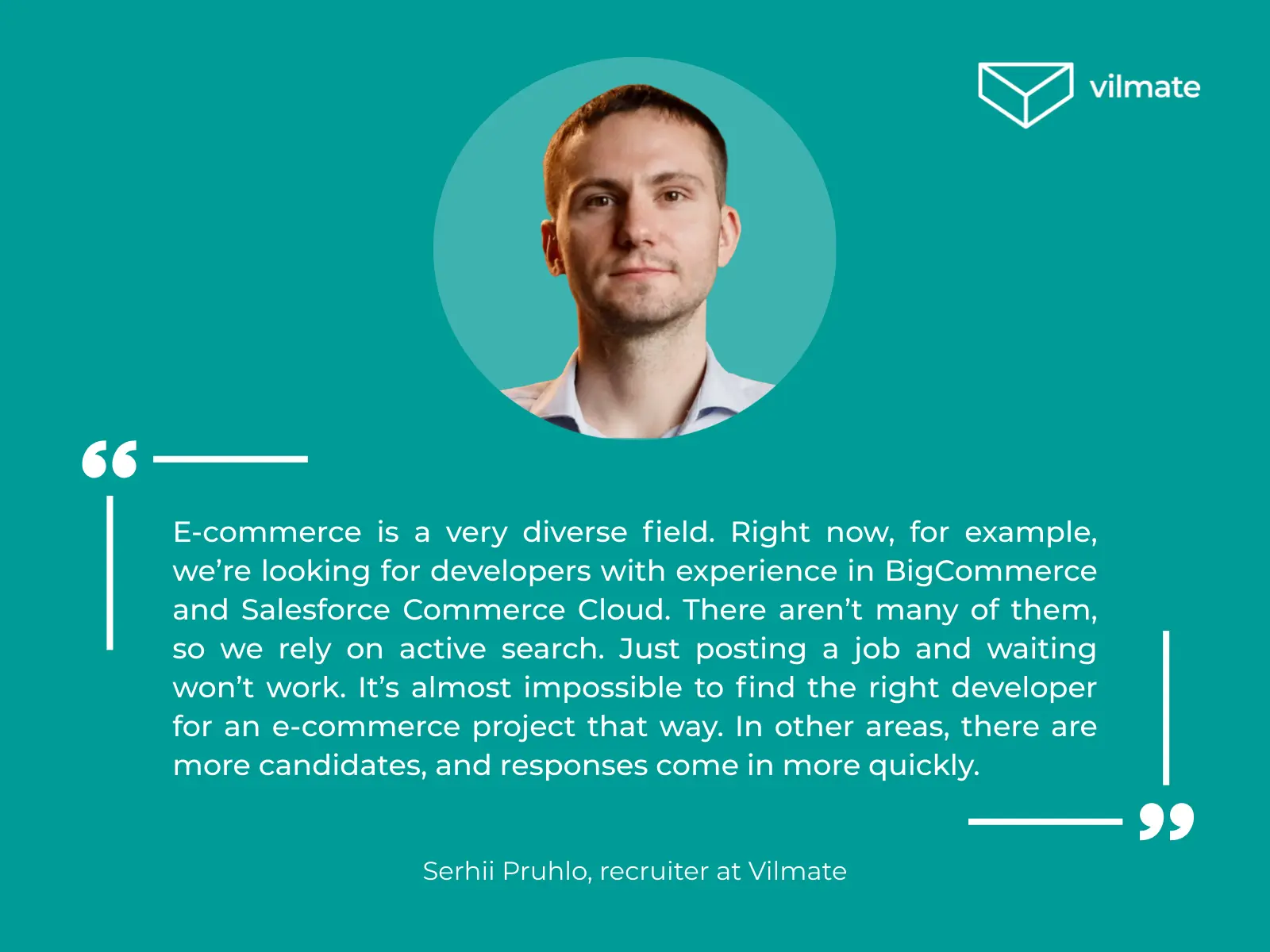
This lack of niche specialists is one of the key reasons why hiring for e-commerce takes more time, effort, and a more focused approach. This is especially true for platforms like SFCC or BigCommerce, where there are only dozens—not thousands—of qualified professionals. This makes a big difference for online retailers who can't afford growth delays or user experience drops.
Hiring for Startups vs. Big Retail: What Kind of Developer Do You Need?
Hiring a developer for an e-commerce project depends a lot on the size of the business. In a startup, everything changes on the fly, and the team is constantly under pressure. In a large retail company, everything must run smoothly and by the book. This directly affects which skills and qualities are essential when hiring.
Serhii Pruhlo:
"There is a difference, though it's not huge. Startups usually look for flexible developers who can adapt quickly, feel comfortable with uncertainty, and handle a broad range of tasks. In larger businesses, the processes are more structured, and developers are expected to have deep expertise in a specific area.
The approach doesn't change dramatically from a recruiting standpoint. But in e-commerce, we often rely on direct outreach—we contact potential candidates instead of just posting a job and waiting for applications."
In many ways, hiring for online retail is like targeted headhunting. This is especially true when a project demands a solid understanding of how e-commerce works—integrating with third-party services, building architecture that can handle heavy loads, and constantly adjusting to user needs. Starting with a generalist is fine for an MVP, but a specialized team becomes essential when it's time to scale.
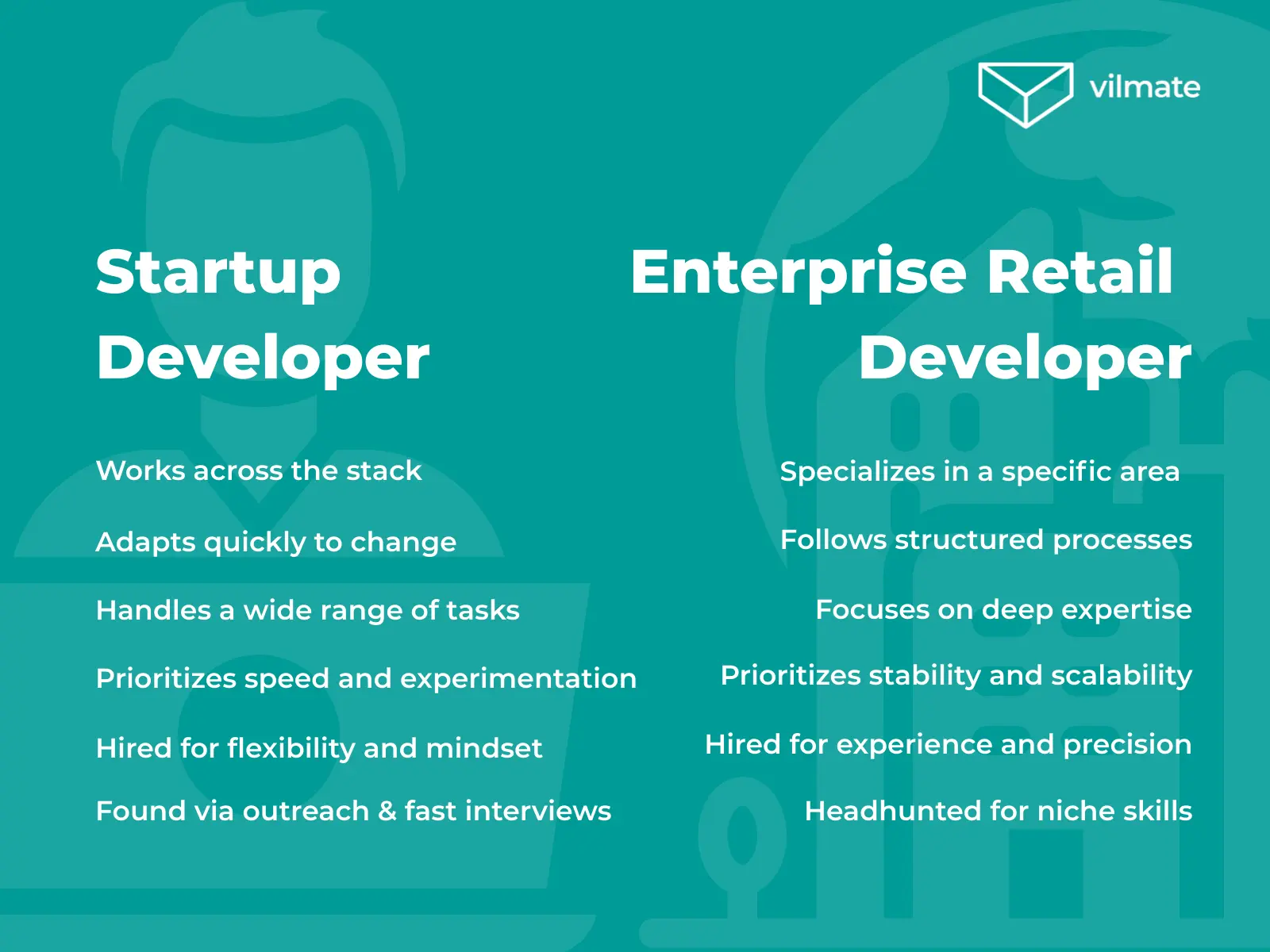
How the E-commerce Developer Market Has Changed
Online retail and e-commerce have made a huge technological leap forward in recent years. This shift has also changed what companies expect from developers. Things that were considered advanced just a few years ago are now becoming the standard.
Serhii Pruhlo:
"The market has changed along with new tech trends. Headless commerce and cloud technologies are now in high demand. That's why we often look for developers with experience in headless architecture and cloud platforms like AWS, Google Cloud, or Azure. Another big shift is that remote work has become the norm. Still, the number of truly skilled and experienced developers remains small."
With the rise of headless systems and cloud migration, hiring developers for e-commerce has become more focused and specific. Just knowing a CMS or framework is no longer enough. For online retailers — where scalability, speed, and flexibility are critical — developers with the right expertise are incredibly valuable. Remote work has opened access to global talent but has also made the competition for top developers much tougher.
Key Skills That Set Great E-commerce Developers Apart
When a business starts looking for a developer for an e-commerce project, the first thing they often look at is experience—how many years someone has worked. But what really matters are the specific technical skills that fit the needs of online retail. From building storefronts to integrating with ERP systems and logistics tools, every project has its own requirements. The skill set depends a lot on the role the developer will play.
Serhii Pruhlo:
"First of all, a developer should have strong knowledge of at least one central e-commerce platform — Adobe Commerce (Magento), Shopify, WooCommerce, SAP Commerce, Salesforce Commerce Cloud, or BigCommerce. From there, it depends on their specialization.
A frontend developer should be confident with HTML, CSS, JavaScript, and TypeScript. They also need experience with popular tools like React, Redux, TailwindCSS, and Sass. Sometimes, knowledge of jQuery, Vue.js, or Angular is also useful.
Backend developers use different stacks depending on the platform. For Magento, it can be JavaScript/TypeScript (with Node.js, Express, Next.js, or NestJS) or PHP.
On the backend, it's also essential to know databases (PostgreSQL, MySQL, MongoDB, Redis), how to build API integrations (REST, GraphQL, Webhooks), and how to work with cloud and DevOps tools like Docker, Kubernetes, AWS, GCP, Azure, and CI/CD pipelines.
There are also full-stack developers — generalists who handle both frontend and backend. These are often in highest demand for e-commerce projects."
This list of technologies may seem long, but it reflects how complex e-commerce is. Hiring for this space isn't just about finding someone who can code — it's about finding someone who understands how e-commerce products work. From user interface to backend logic, from performance under high traffic to business needs — the developer has to see the full picture. And if the project is already large or growing fast, having a full-stack team is often essential.
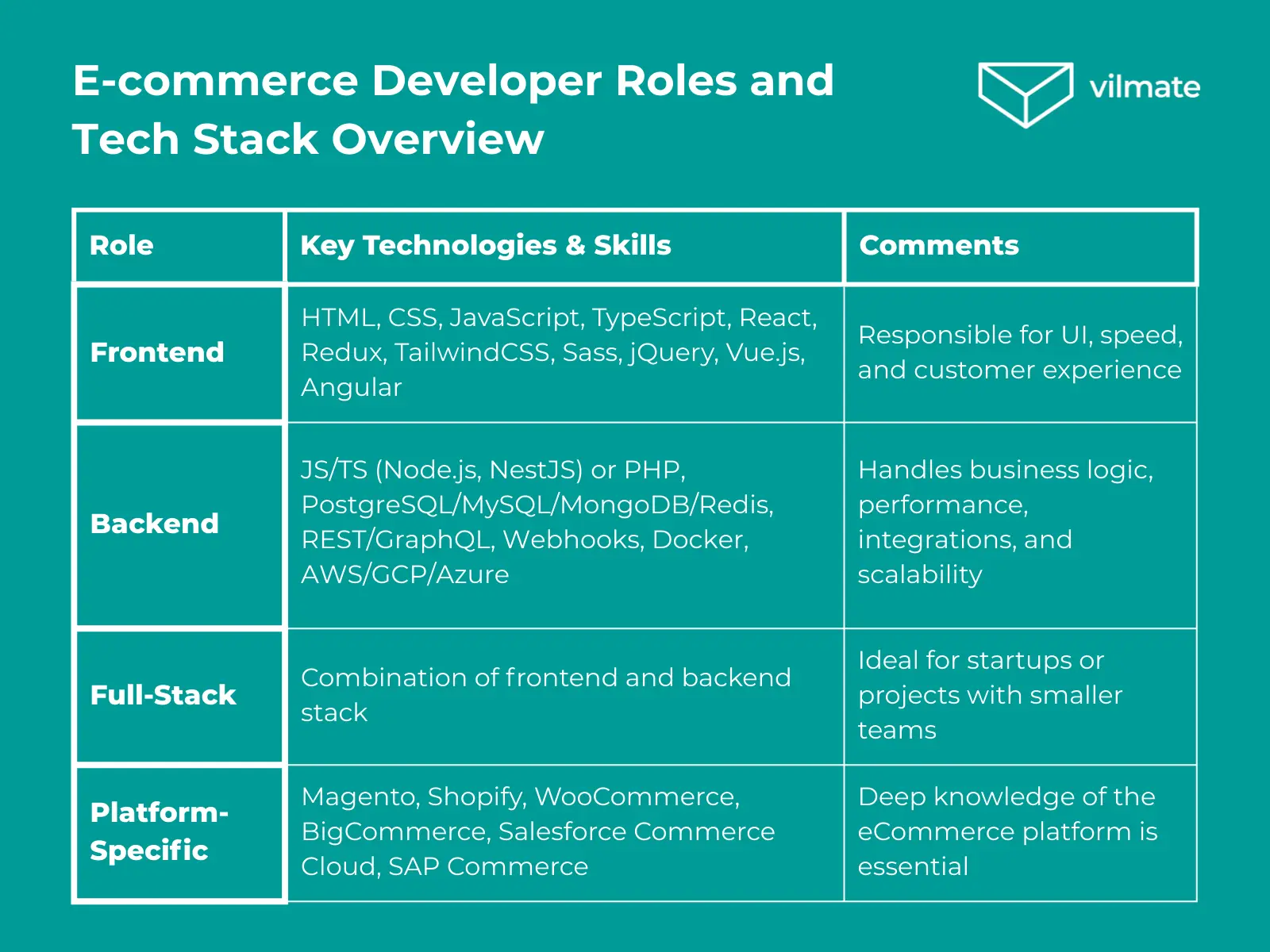
Different CMS Platforms Come with Different Hiring Challenges
Not all CMS platforms are equally popular or easy to hire for. When looking for a developer for an e-commerce project, it's important to remember: behind every trendy name is a specific tech ecosystem — and some of them are hard to find talent for. This is especially true for platforms built specifically for online retail.
Serhii Pruhlo:
"I would break CMS platforms into a few groups.
First, there are general-purpose systems like WordPress, Joomla, Drupal, HubSpot, and Wix. They're flexible and widely used, and many developers know them. For example, finding a WordPress or Drupal expert is usually pretty straightforward.
Then there are CMS platforms designed for e-commerce: Adobe Commerce (Magento), Shopify, WooCommerce, SAP Commerce, Salesforce Commerce Cloud, and BigCommerce. These are more complex in structure and require deeper expertise, and fewer developers specialize in them. I've personally searched for BigCommerce and Salesforce Commerce Cloud developers, and it's definitely not easy.
There are also headless CMS options like Prismic and Contentful. These are used less often, so we don't see them in job requests as frequently."
When a business chooses a CMS platform, it's important to consider its features and how easy it will be to find the right team. In fact, according to BuiltWith, the most popular CMS platforms for e-commerce websites are Shopify, Wix Stores, and WooCommerce Checkout — technologies with large talent pools and strong community support. Choosing one of these widely used platforms can significantly simplify hiring and reduce risks. In other cases, working with a recruiter who knows where to look and how to approach candidates is crucial. Otherwise, your project might face delays — or miss the launch date entirely.
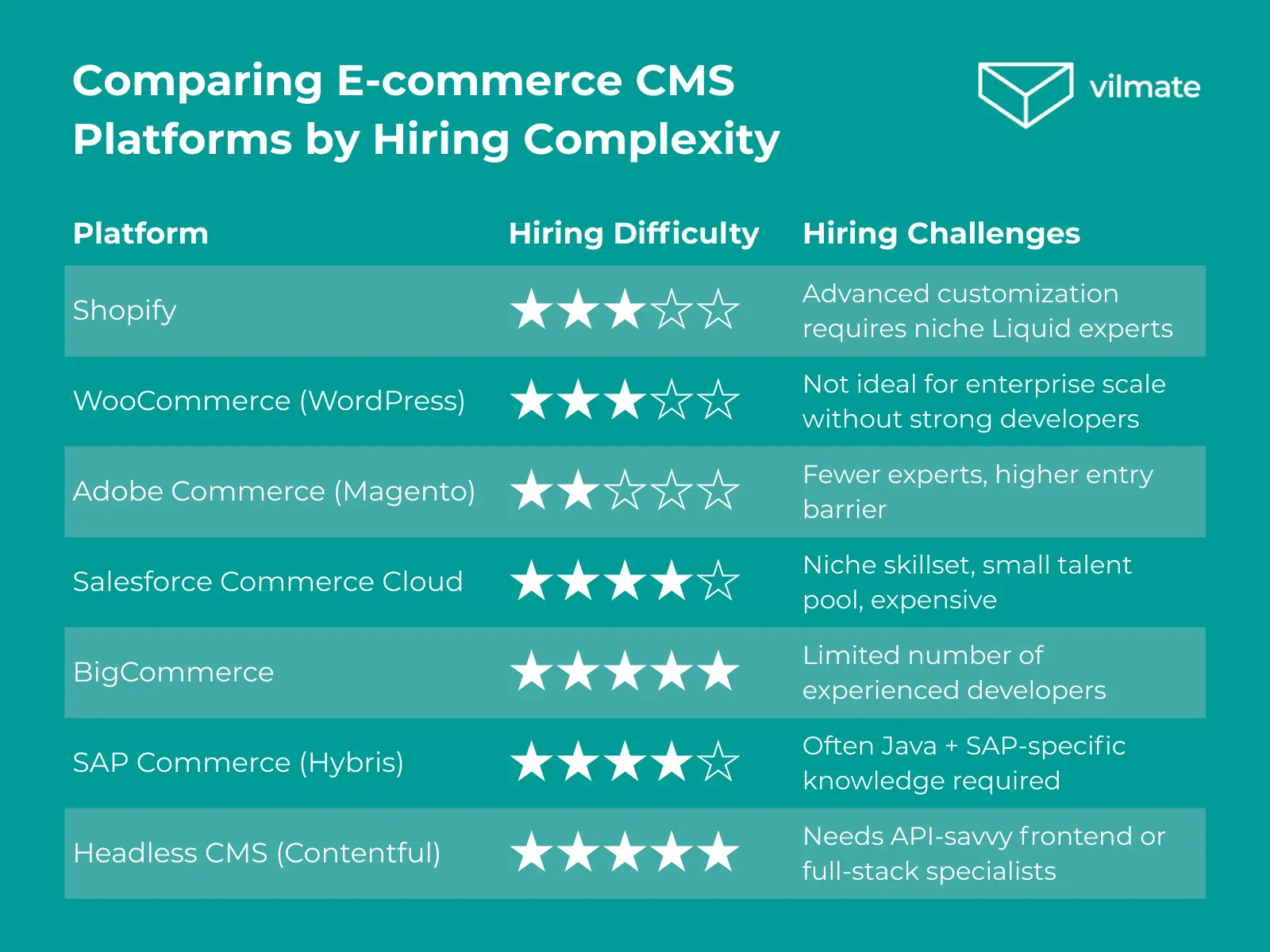
The Soft Skills That Make E-commerce Developers Stand Out
Technical skills are only part of the picture. In e-commerce, soft skills matter just as much — especially the ones that help a developer feel like part of the business, not just someone writing code from a distance. These qualities often play a key role in the hiring decision.
Serhii Pruhlo:
"In my view, the most important soft skills for a developer in an e-commerce project are teamwork and adaptability — the ability to learn new technologies quickly. It's also important to be business- and user-focused. A good developer understands the company's needs and the end user's expectations. And strong analytical thinking is a must. You need to be able to work with large amounts of data and make decisions based on real insight — not guesswork."
These qualities are especially important in retail projects. E-commerce is a fast-moving space. Promotions go live, customer behavior changes, and priorities shift constantly. A developer who can quickly dive in, understand the "why" behind a task, and adapt without hesitation becomes a real gem for the team.
How the Hiring Process Works for an E-commerce Developer
Hiring a developer for an e-commerce project isn't just about posting a job and waiting for responses. It's a well-structured process where each step helps find not just a coder but someone who truly fits the business — especially in retail.
Serhii Pruhlo:
"It all starts with analysis. Together with managers or the client, we define what technical and soft skills the project needs. This helps us create a clear profile of the ideal candidate.
Then, we write the job post and publish it — on our website and platforms like DOU.
But just waiting for applications doesn't work — especially when we're hiring for platforms like BigCommerce or Salesforce Commerce Cloud. That's when we switch to active sourcing. We look for candidates ourselves — on LinkedIn, GitHub, and sometimes on less apparent platforms. We make the first move.
Next comes the first contact and screening. We check whether the experience is relevant, assess the candidate's English skills, and discuss the candidate's motivation.
Then comes the technical interview. Here, we focus not only on the tech stack or specific platform knowledge (Shopify, Magento, etc.) but also on understanding APIs, databases, and e-commerce architecture. For complex projects, we may include a live coding session or send a test task.
One more key step is the cultural interview. We check how well the person fits into the team, how they handle changes, and how flexible they are. The client often takes part in this stage too. If everything goes well, we will make the final offer and move to onboarding."
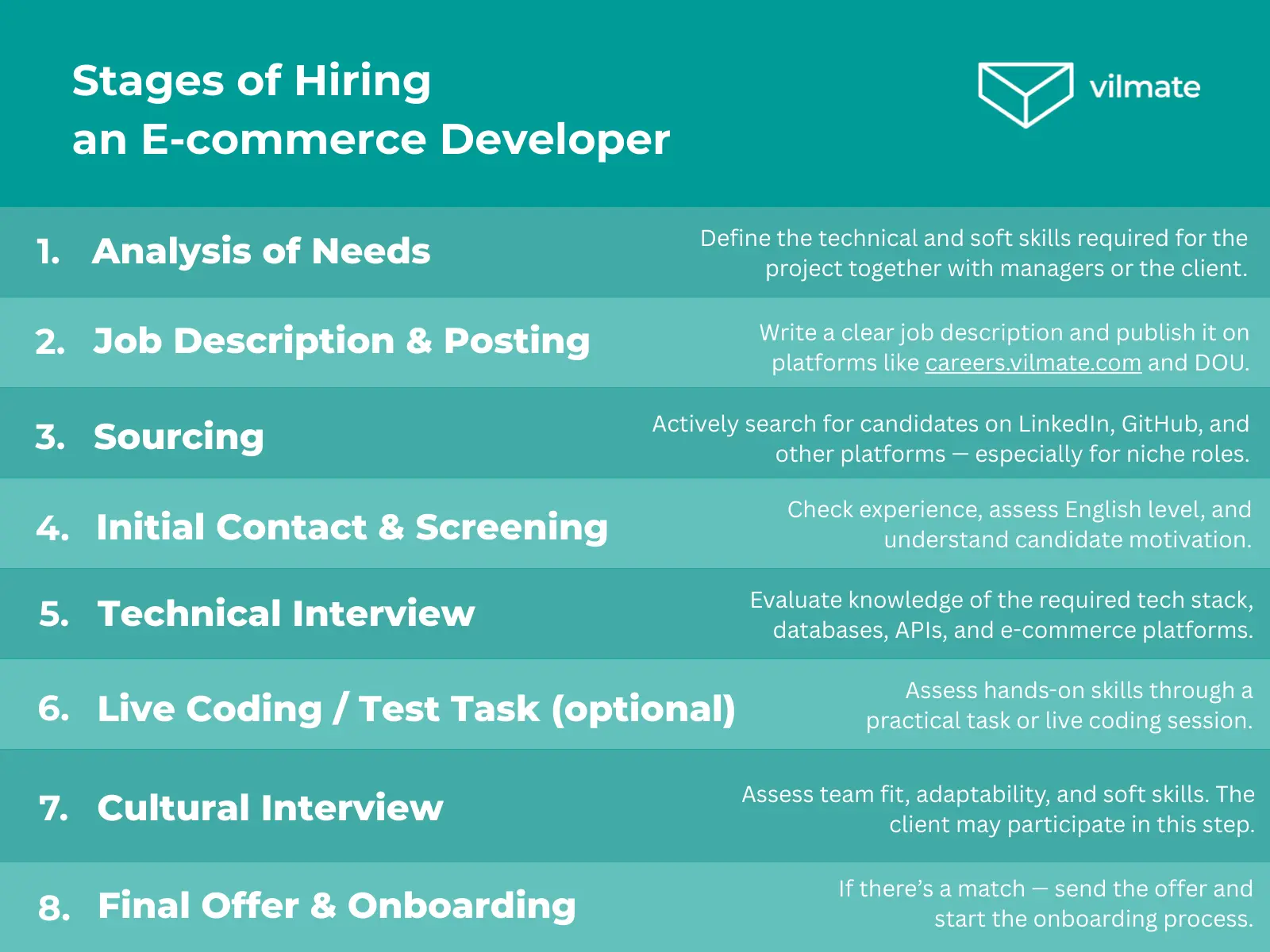
Looking at the entire process, it's clear that hiring for retail isn't just about "finding someone who knows the right framework." It's about finding a true match—in skills, mindset, and pace. That's why the process is layered. It helps make the right decision from the very beginning.
Hiring Pitfalls to Avoid When Building Your E-commerce Team
Even when a company takes hiring seriously, mistakes can still happen. In e-commerce, where everything is closely tied to business results, even one wrong decision can be costly.
Serhii Pruhlo:
"One of the most common problems is unclear requirements. Sometimes, job descriptions combine several roles — a full-stack, a frontend, and a backend developer — without a clear understanding of who is needed for the project.
It also happens that the client doesn't fully know what technologies are required, making the hiring process harder from the start.
Another mistake is ignoring soft skills. A developer might be technically strong but unable to work well in a team. If the business needs someone who can communicate, suggest ideas, and collaborate closely, not checking for soft skills can lead to the wrong hire.
Many also underestimate the specifics of e-commerce. A developer without retail experience may not realize how important a smooth checkout flow is or how payment systems and logistics integrations work. But in retail, these things are essential.
Finally, there is no proper onboarding. If a new developer doesn't get a clear understanding of the project from the beginning, they waste time trying to figure things out. Long decision-making processes can also be a problem. The competition for strong developers is high, and delays often mean losing a good candidate to another offer."
When these things are considered early on, hiring for an e-commerce project becomes a thoughtful, structured process — not a gamble. And when it's done right, everyone benefits: the business, the developer, and the whole team.
Conclusion
Hiring an e-commerce developer isn't just about closing a role — it's a strategic move directly affecting how fast your product grows, how stable your online sales are, and what kind of experience your customers get. What matters is not just finding someone with the right tech stack but someone who understands online retail dynamics works well in a team, adapts quickly, and shares your business goals.
At Vilmate, we've learned that when the hiring process is clear, structured, and well-managed, finding the right developer results from solid planning — not luck. We know where to look and how to hire for specialized needs, whether it's BigCommerce, Salesforce Commerce Cloud, Magento, or headless platforms. And we know how to build full teams — from the very first hire to full-scale technical delivery.
If you've reached the point where hiring a developer is slowing down your e-commerce launch or blocking business growth — let's talk. We'll help you build a team that doesn't just write code but actively moves your product forward with precision, reliability, and real expertise.





